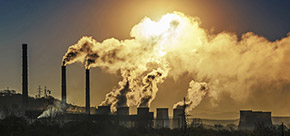As part of the Government’s launch of its climate change initiative, the Emission Reduction Fund (ERF), a new Direct Action policy paper has been released to swathe of scathing criticism. The new policy will basically allow the country’s biggest polluters to set their own pollution limits – possibly rendering emissions control useless.
Energy Program Director at the Grattan Institute Tony Wood, believes the measures laid out in the policy paper will not be effective. “The safeguard mechanism was always a critical element of the Direct Action plan, but there is nothing in this safeguard mechanism that puts any absolute limit on a whole range of sectors,” he said.
There are concerns that the system, designed so that no one company can be caught going over its prescribed emissions thresholds, could make it difficult for regulators to police carbon caps. In effect, Australia’s largest polluters, or companies which release more than 100,000 tonnes of carbon emissions into the atmosphere per year, will be able to set a benchmark to the equivalent of its highest levels of carbon emissions in the last five years, effectively rendering climate control useless.
The electricity sector, which is responsible for one-third of the country’s total carbon emissions may be given special exemptions, because, according to the paper, “low-cost electricity was important for the competitiveness of other industries.” Environment Minister Greg Hunt defended the proposal for the electricity sector as a “measure supported by the industry.”
Companies that do exceed the thresholds may have to purchase offset penalties, but Mr Wood feels that harsher penalties are required to make this paper even remotely effective. “For a penalty to work it has to be a deterrent, and for it to be a significant penalty for a big polluter fines would have to be in the tens of millions of dollars,” he said.
What do you think? Are Australia’s biggest polluters being given a free rein? Is this Direct Action Policy even worth pursuing, considering the safeguards can be set so high as to not be breached, and the penalties for doing so are virtually non-existent at this point?

